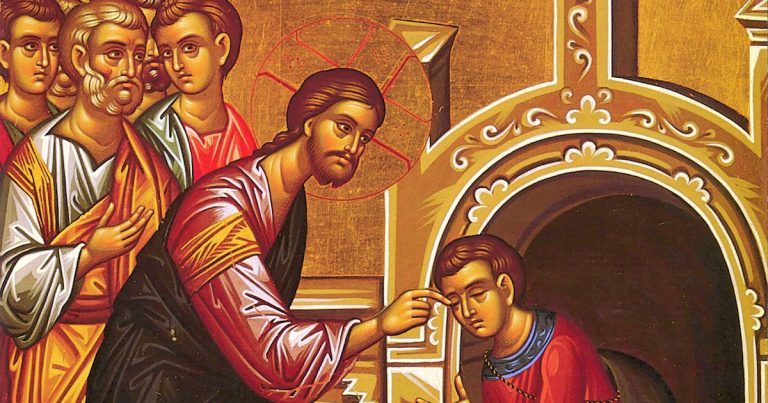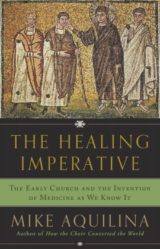By Mike Aquilina
Mike Aquilina is the best-selling author of more than forty books on Catholic history, doctrine, and devotion, including The Healing Imperative: The Early Church and the Invention of Medicine as We Know It.

“Those who are well have no need of a physician, but those who are sick,” Jesus told the Pharisees (Matt 9:12). The obvious implication: when you’ve come down with a bad case of sin, it’s time to call Christ the Physician. In the generations after the apostles, Christian thinkers latched on to the idea of Christ the Physician who heals sick souls.
In fact, we could say that Christ as healer is one of the characteristic themes in Christian writings of the years after the apostolic generation. Ignatius of Antioch, writing in AD 107 (when the apostles were still a living memory), spoke of Jesus as a physician. The early Church historian Eusebius described Jesus’ ministry with lines taken directly from Hippocrates:
“A devoted physician, to save the lives of the sick, sees the horrible danger yet touches the infected place, and in treating another man’s troubles brings suffering on himself.
That’s the ideal doctor for Hippocrates—and for Eusebius, it’s Jesus Christ.
The title of “Divine Physician” took root in Christian thought, especially in the East. And if Christ was the healer of both souls and bodies, and healing the body was a good thing, then one way a Christian could imitate Christ was by being a physician. So Christians instinctively responded to Jesus’ healing imperative by dedicating themselves to the practice of medicine.
Justin Martyr in the 100s and Origen in the 200s both testify that many of their coreligionists were medical doctors. The historian of medicine Gary Ferngren cites studies of the professional makeup of the early Church and concludes that “some 150 physicians can be identified with reasonable certainty from the Roman imperial period.”
From this we might conclude that doctors were, more than any other professional group, drawn to Christianity. Or perhaps Christians were drawn to medical practice more than to any other kind of work. In any case, the statistics suggest much about the compatibility and similarity between the life of grace and a doctor’s life of service.
There was, however, no distinctively Christian way of practicing medicine. Christians took medical science as they found it. A Christian doctor would offer you the best medical care in the Hippocratic tradition—which was, you remember, a very good tradition, based on experience and experiment, that could produce very good results. Except for encouraging you to pray to Christ the greatest Physician, there was nothing a Christian doctor did that his pagan counterparts might not do.
But there were things a pagan doctor might do that a Christian doctor wouldn’t do. In spite of what he had sworn in the Hippocratic Oath, for example, a pagan doctor might perform an abortion. Abortions were common in the time of the early Roman Empire—sometimes with fatal results for the mother as well as the child. Infanticide was common, too—or at least “exposure,” meaning leaving the newborn baby (usually a girl, because girls were considered worthless) out with the trash to die. A Christian doctor would not cooperate with these abominable practices. He wouldn’t prescribe contraceptives, either, and he wouldn’t assist a suicide.
There was one more thing a Christian doctor wouldn’t do: he wouldn’t turn patients away. Christian physicians considered themselves bound by another imperative—unrestricted hospitality.
But what was the duty of a Christian toward the sick? If visiting the sick was one of the things the King demanded of us, what exactly did that entail? Was just showing up enough, or did the Church have some sort of responsibility to treat the illness, too?
Gregory of Nyssa insisted that caring for the sick was an essential duty of the Christian. It was true that it could be hard work, even dangerous work, but it was what Christ demanded of us. And if Christ demanded it of Christians, then the whole Church ought to get involved.
Already back in the time of the apostles we see the whole Church getting involved in the care of the sick. James’ letter is sometimes cited as the institution of the sacrament of the anointing of the sick, but it is more accurate to say that James gives us confirmation in Scripture of what the Church was already doing.
What James is talking about, of course, is a form of prayer which is a strictly religious response to illness. Did he think the responsibility of the Church ended there, or did he expect his flock to do some physical caring for the sick as well? We can guess by analogy that James expected the Church to get out there and do something.
“If a brother or sister is poorly clothed and in lack of daily food, and one of you says to them, “Go in peace, be warmed and filled,” without giving them the things needed for the body, what does it profit? (James 2:15–16)
Certainly James wouldn’t tell us not to pray that the naked should be clothed and the hungry fed. “The prayer of a righteous man has great power in its effects” (James 5:16). But James would also expect us to do something more physical. Pray—but don’t just sit there. Bring the clothes and food.
The same would also be true of sickness, wouldn’t it? Pray for the sick brother or sister. But bring the medicine, too. After all, as our friend Origen pointed out, God created medicine for a reason.
You Might Also Like

The Healing Imperative: The Early Church and the Invention of Medicine as We Know It reconstructs the fascinating history of a uniquely Christian institution: the hospital. Underlining how the virtues of charity and hospitality motivated the first generations of Christians, along with Jesus’ explicit command to heal the sick, Aquilina shows just how revolutionary the actions of Christian doctors and nurses were and how they transformed society in ways that still reverberate today.

